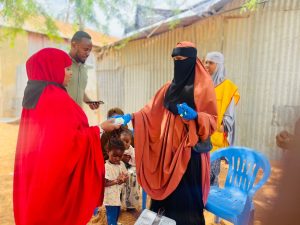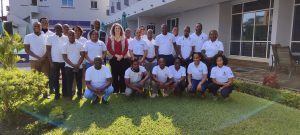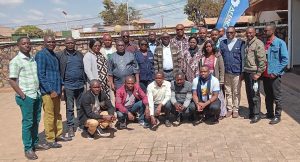Senegal frontline FETP Cohort 16 focuses on reproductive health personnel to combat maternal and neonatal mortality
-
by
AFENET


Although Senegal has registered steady progress in the fight against maternal deaths in the last nearly three decades, seeing the maternal mortality ratio falling from 510/100,000 in 1992 to 392/100,000 in 2010 (EDS V) and from 392/100,000 to 236/100,000 live births (EDS 2017), the fight is still on
To accelerate the rate of decline and eliminate preventable maternal and newborn deaths, various strategies are being implemented. One of the strategies is the training of midwives in maternal death surveillance and response.
The West African country has embarked on training frontline health workers such as Reproductive Health Coordinators (CSR), Midwife-Mistresses (MSF) from hospitals and districts, and supervisors of pediatric services in field epidemiology. This is in collaboration with the Direction de la Santé de la Mère et de l’Enfant (DSME), with funding support from the Buffet Foundation and technical support from AFENET.
To this, the Senegal Field Epidemiology Training Program (FETP), therefore, held training for Cohort XVI residents from 3 – 8 July 2023 at the Amarilys Hotel in Saly. The aim was to improve the collection and analysis of basic surveillance data on maternal and neonatal deaths; improve the quality and use of surveillance data on maternal and neonatal deaths; improve the sharing and dissemination of information on maternal and neonatal mortality; and improve the response to maternal and newborn deaths, including investigations.
The basic FETP (frontline level) provides an opportunity for improving surveillance of maternal and newborn deaths.
To ensure greater success in training midwives, a workshop on adapting FETP frontline training materials to maternal and newborn health was held prior from June 12 to 16, 2023 in Saly.
The workshop was opened by Dr. Barnabé Gning (DGS), Director General of Health (DGS), in the presence of Dr. Amadou Doucouré, Director of the DSME, Dr. Boly Diop, Head of the Division of Epidemiological Surveillance and Vaccine Response (DSRV), Dr Ousmane Dieng, WHO Representative and Dr MBouna Ndiaye, FETP Resident Advisor for Senegal.
During this workshop, presentations focused on the public health surveillance cycle and its application to maternal, perinatal, and response mortality surveillance (MPRDS).
Discussions focused on the following points:
· The problem of the geographical inaccessibility of certain reference structures, which increases the risk of maternal deaths,
· The low rate of implementation of recommendations arising from death audits,
· Late organization of maternal and neonatal death audits due to the unavailability of specialists,
· The problem of deaths during evacuation. This issue was addressed during the development of the SOP/SDMPR. In effect, the referral facility records the death and draws up the certificate, then the originating facility registers it;
· The need to integrate maternal death data into the DHIS2 tracker;
· The notification deadline for maternal, neonatal, and stillbirth deaths, which is 24 hours if the death occurs in a health facility and 48 hours if it occurs at the community level.
- Following this workshop, participants will carry out an initial fieldwork on the quality audit of surveillance data and the synthesis of surveillance data over 6 weeks under the supervision of a mentor.



